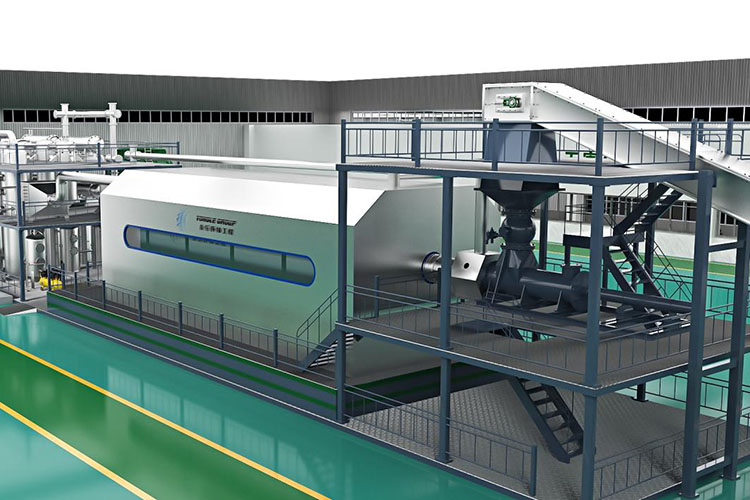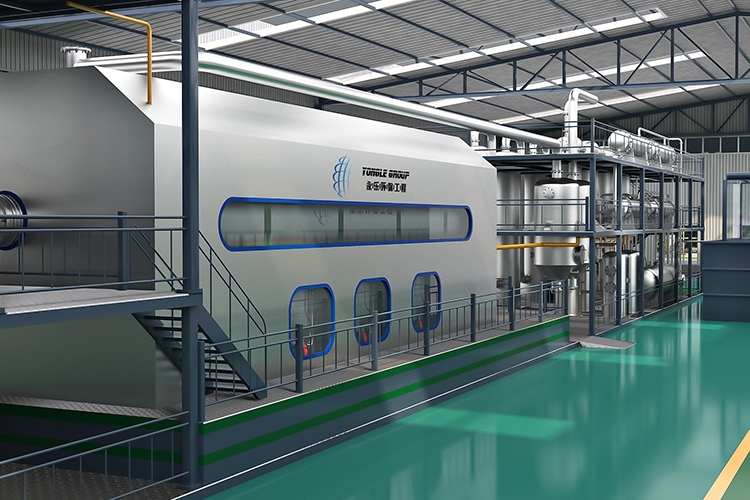In modern society, with the acceleration of urbanization and the increase of population, the production of organic solid waste (such as kitchen waste, agricultural waste, livestock manure, etc.) is also constantly increasing. How to efficiently handle these organic solid wastes has become a major challenge facing countries. Traditional waste disposal methods, such as landfill and incineration, not only occupy a large amount of land resources, but may also cause serious pollution to the environment. Therefore, organic solid waste treatment equipment has emerged and demonstrated its significant advantages.
Firstly, the biggest advantage of organic solid waste treatment equipment is its environmental benefits. Traditional landfill treatment not only requires a large amount of land resources, but may also cause environmental problems such as groundwater pollution and soil pollution. Although incineration can quickly reduce the volume of garbage, it will produce a large amount of carbon dioxide and other harmful gases, further exacerbating air pollution and greenhouse effect. Organic solid waste treatment equipment uses environmental protection technologies such as biological treatment to convert organic solid waste into environmentally friendly products, fundamentally reducing the impact of garbage on the environment. For example, through anaerobic fermentation technology, equipment can convert organic waste into biogas, reducing the volume of waste and achieving resource reuse. In addition, the processed organic waste can also be converted into organic fertilizers, returned to the land, and improve soil quality, truly achieving the goal of "turning waste into treasure".

Secondly, economic benefits are one of the important reasons why organic solid waste treatment equipment is highly favored. The traditional garbage disposal method not only occupies a large amount of land, but also incurs high processing costs. Organic solid waste treatment equipment greatly reduces processing costs through efficient resource utilization. The products processed by the equipment, such as organic fertilizers, biomass fuels, etc., can be directly used for agricultural production or energy utilization, bringing additional economic benefits to enterprises and society. Meanwhile, the renewable energy such as biogas generated by the equipment during the processing can be used for power generation or heating, further reducing energy consumption and costs. This economic sustainability not only helps alleviate the financial pressure of waste disposal, but also promotes the development of circular economy.
Technological progress provides a guarantee for the efficient operation of organic solid waste treatment equipment. Modern organic solid waste treatment equipment usually adopts advanced biotechnology, pyrolysis technology, etc., which can degrade organic matter and convert it into useful resources in a short period of time. For example, the fermentation tank in the equipment accelerates the decomposition process of organic matter by controlling temperature, humidity, and oxygen concentration, enabling efficient disposal of waste in a short period of time. In addition, many devices are equipped with intelligent control systems that can monitor various parameters in real-time during the processing, ensuring the stability and efficiency of the processing. This automated and intelligent operation method not only improves the processing efficiency of the equipment, but also greatly reduces the complexity of manual operations and enhances the overall reliability of processing.

The social benefits of organic solid waste treatment equipment cannot be ignored. With the increasing awareness of environmental protection among people, society's requirements for garbage disposal are also becoming higher and higher. The organic solid waste treatment equipment effectively treats organic waste, reduces the threat of garbage accumulation to the environment and public health, and improves the quality of life of residents. Especially in areas with rapid urbanization, these devices help solve the problem of garbage disposal and prevent further deterioration of environmental pollution. At the same time, by promoting organic solid waste treatment technology, the overall environmental awareness of society has been improved, and more people have begun to pay attention to resource recycling and sustainable development, which undoubtedly has important significance for the long-term development of society.
In summary, organic solid waste treatment equipment has become an effective solution to address the challenges of organic solid waste treatment due to its significant environmental, economic, technological, and social benefits. By promoting and applying these devices, we can not only effectively reduce the negative impact of waste disposal on the environment, but also achieve the recycling of resources and contribute to the sustainable development of society. In the future development, with the continuous advancement of technology and policy support, organic solid waste treatment equipment will play an important role in a wider range of fields, providing solid guarantees for building a better and more environmentally friendly society.
Yongle Environmental Protection is mainly engaged in the research and development, production and sales of complete sets of technical equipment for organic solid waste disposal and comprehensive utilization. Production and manufacturing, domestic waste treatment equipment, tire pyrolysis equipment, medical waste disposal equipment, hazardous waste disposal equipment, and achieve efficient and comprehensive utilization of resources through independently developed low-temperature anaerobic pyrolysis equipment technology solutions.
Tags:Advantages and Explanation of Organic Solid Waste Treatment Equipment,Organic solid waste treatment equipment,YONGLE GROUP
 Latest news
Latest news


























